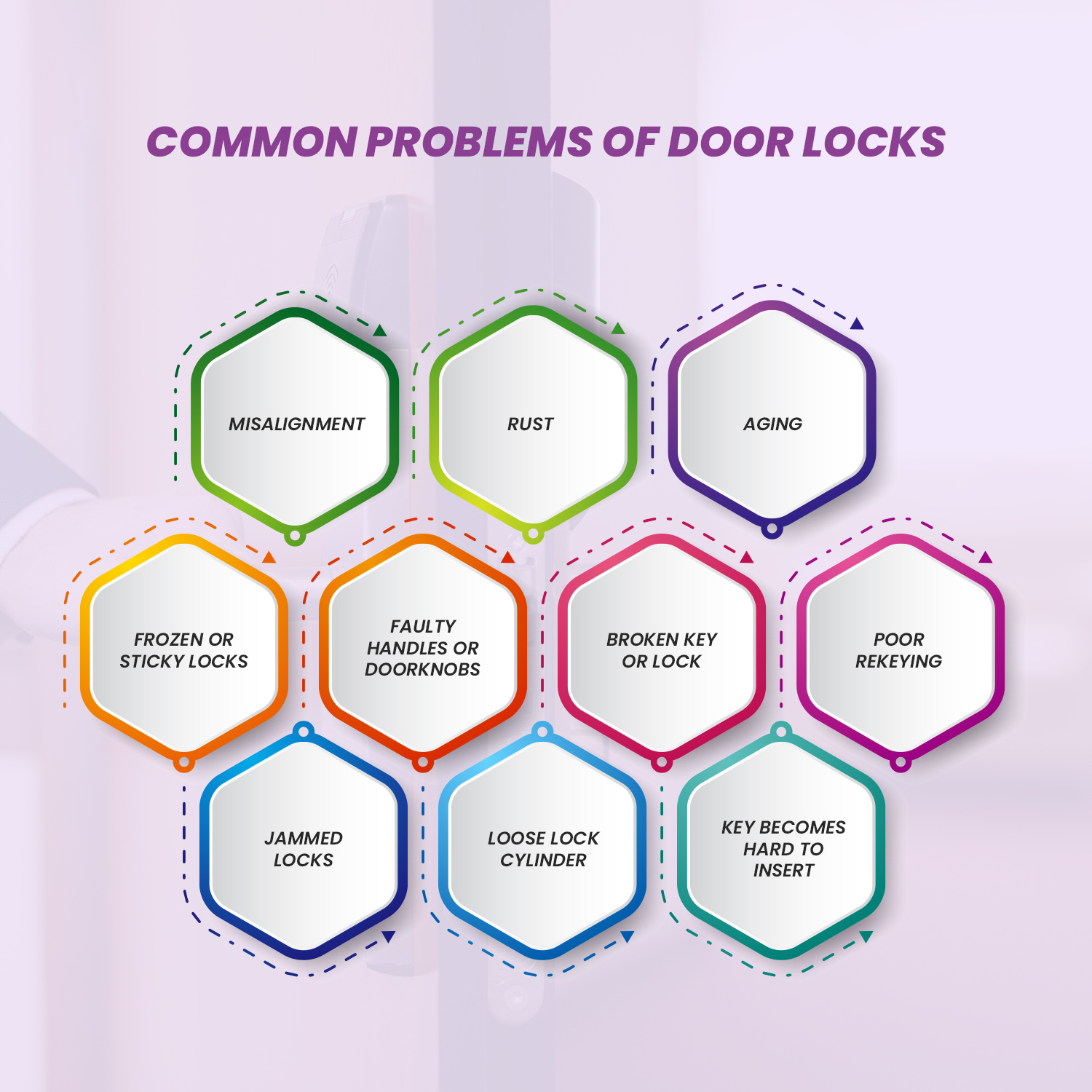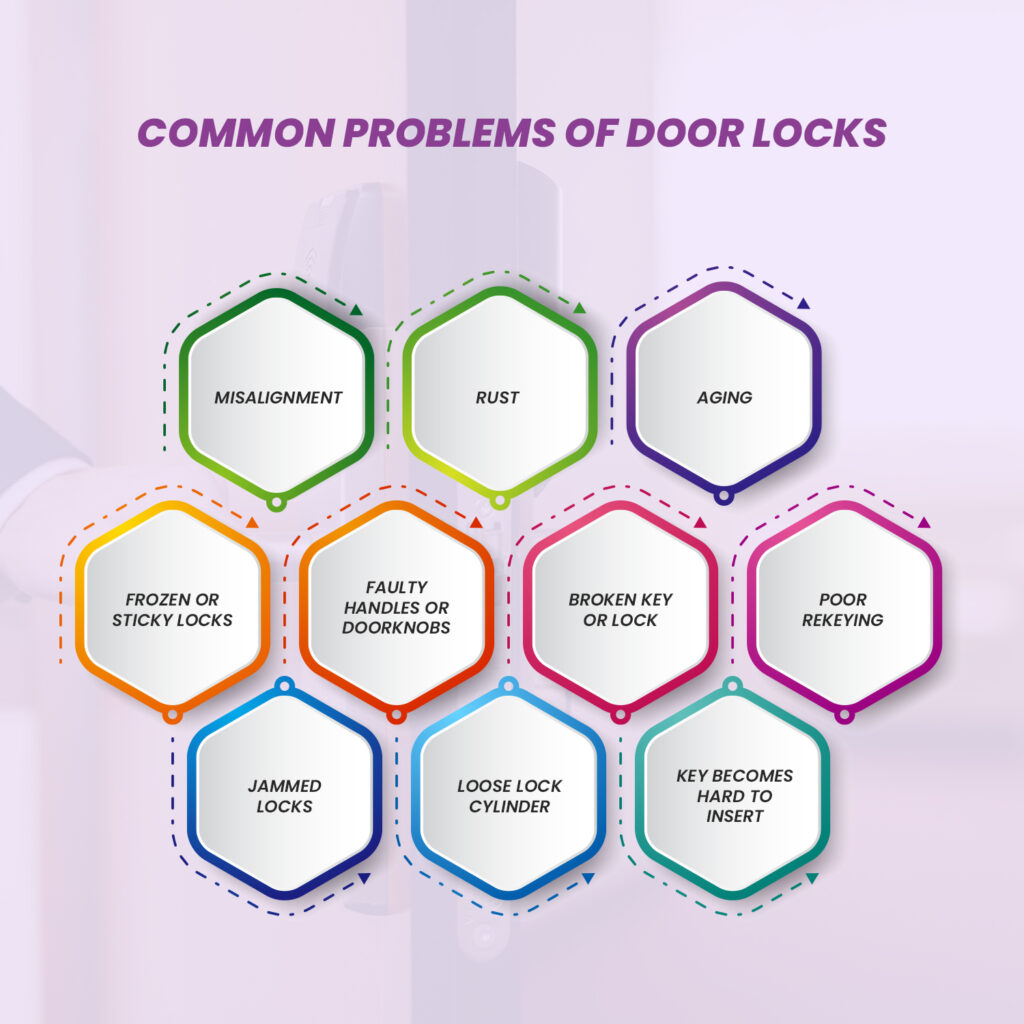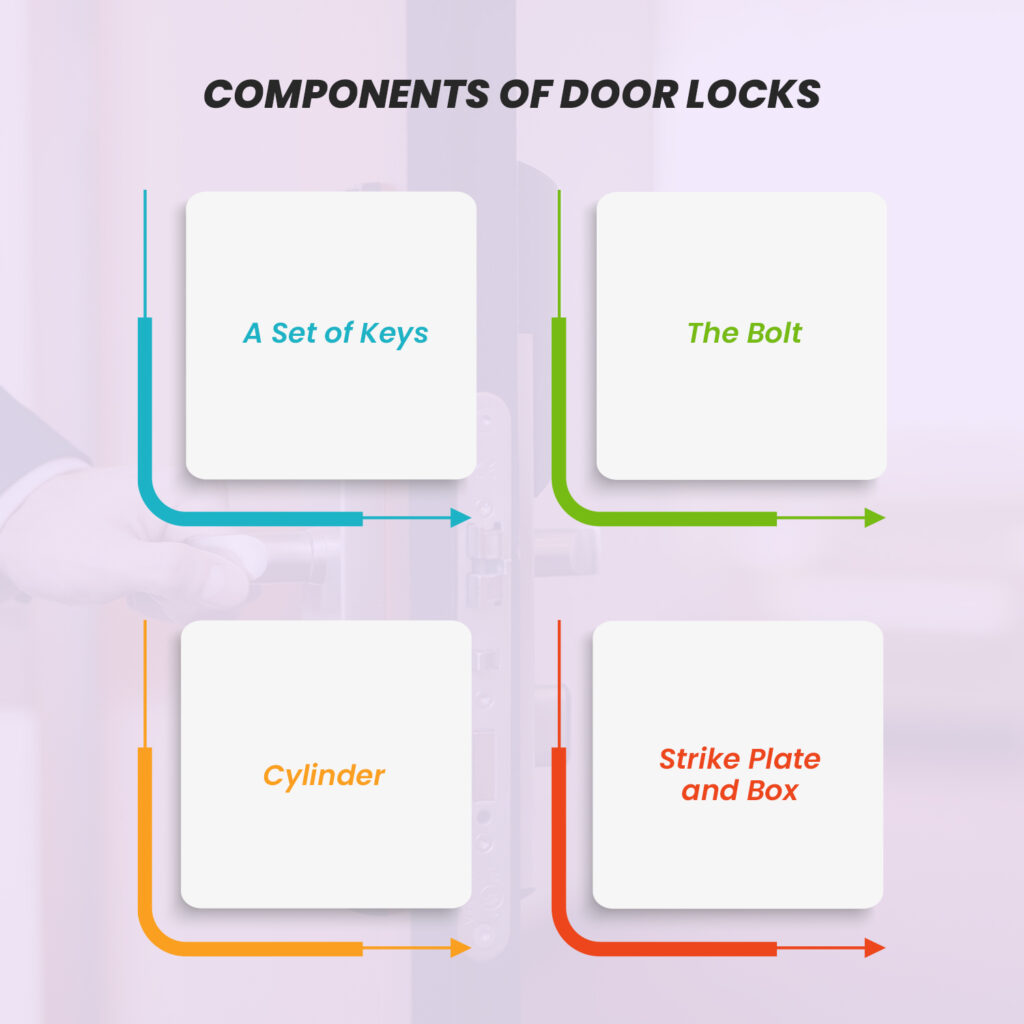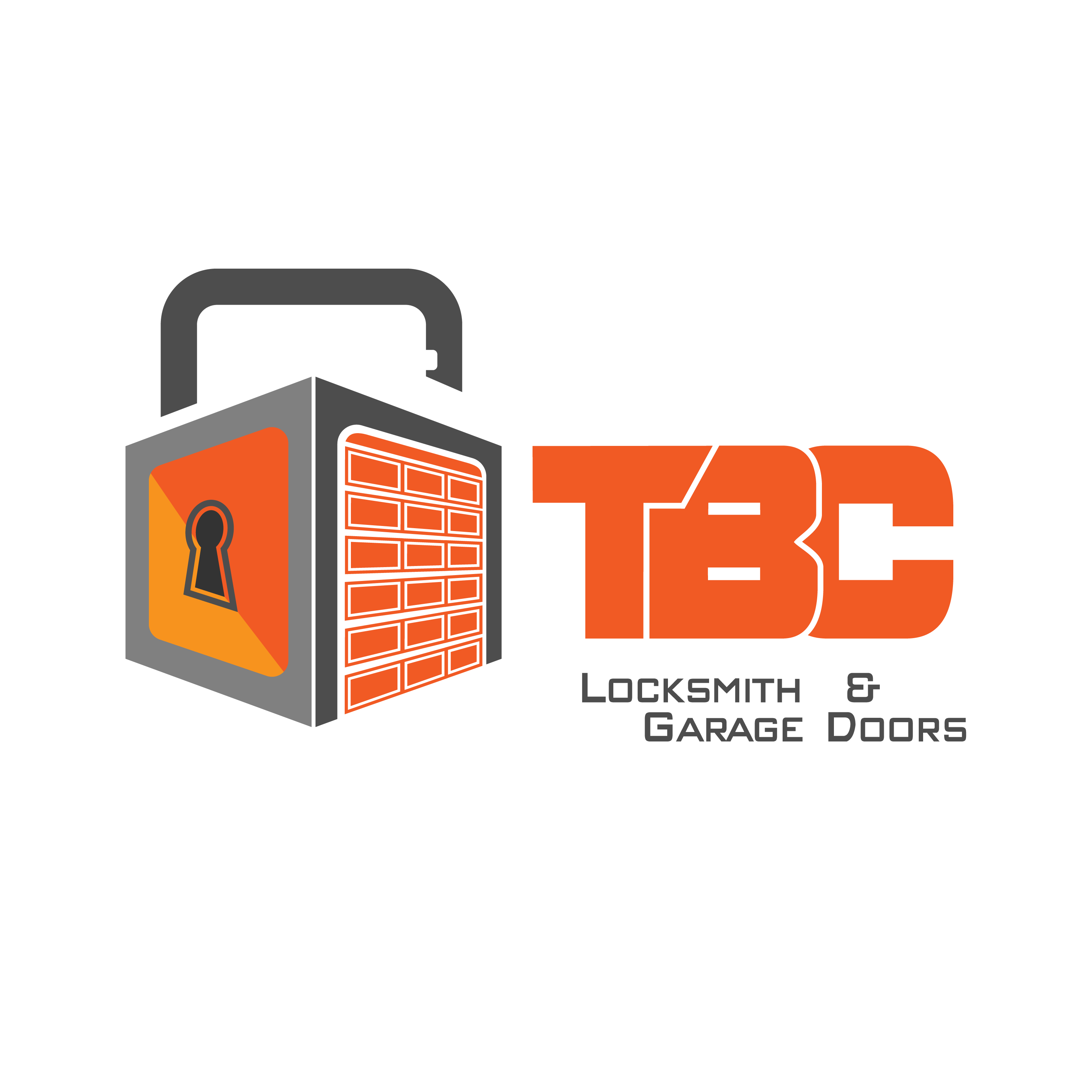
Door locks often develop faults at one point or the other. Sometimes, these problems can be solved quickly, especially if you fix them on time. But, sadly, most people ignore these signs until they cannot insert their keys or the knobs become badly damaged. These are some common problems that door users face and easy ways to fix or prevent them.

1. Misalignment
When locks are misaligned, it means their parts are not lined up as they should be. Most locks consist of keys, a bolt, a cylinder, a strike plate, and a box. So, the components of door locks include;

A set of keys
Locks often come with a set of two to three keys. This number may be moiré depending on the manufacturer.
The bolt
The bolt is often called a latch. It is a small metal block that moves in and out when you turn the key. For example, when you lock the door, it moves into a hole in the door frame and prevents the door from opening unless you turn the key again.
Cylinder
The cylinder is the part your key goes into when you insert it in a lock. It is called a cylinder because of its cylindrical shape. To engage a lock, you turn the key, activating and aligning a set of pins inside the lock.
When the pins are activated this way, it prevents the door from opening. These pins are uniquely matched to a set of keys. So, you cannot reactivate them if you use a different key. This is why the wrong keys don’t work.
Strike plate and box
The strike plate is a metal plate that is usually screwed into the door frame. The box is a metal square hole that is also placed in the door frame. The box is where the bold go when the door is closed. The strike plate keeps it in place.
If any of these parts of a lock are placed wrongly, it will not function properly. For instance, if the strike plate in the door frame is not on the same level as the bolt. In that case, the bolt will not enter the box, and the door will not be locked.
The solution is to get the locks appropriately aligned. You may detect the source of the alignment by examining the door and the door frame. Then, it’s best to get a locksmith to realign the locks to avoid further damage.
2. Rust
Almost all kinds of metal rust at one point or the other. Since door locks are often metal or contain metal parts, rust can damage or destroy them. Sometimes, the rust is inside the lock itself, so you may not see it.
It can eat away at various parts of the mechanism or buildup inside the lock. This will make it difficult for locks to function correctly. However, this does not mean that the lock cannot be repaired. Locksmiths have tricks to clean out the rust and get it working good as new.
3. Aging
Like most other tools, locks weaken over time. Usually, old latches are very slow. As a result, it becomes harder to turn the key, or you may have to jiggle it several times.
The effects of wear and tear are also significant. Small parts of the mechanism could fall out or become displaced. So, it would be hard to align the key when locking or unlocking the door.
The solution to this is to replace the old locks with newer ones. If you keep using the weak latches, you would be putting your security at risk. This is because they can be picked or broken by burglars. Therefore, it is best to keep locks functioning at an optimum level.
4. Frozen or sticky locks
If the weather changes, you may notice differences in how your lock works. For instance, a drop in the temperature can freeze your locks, while increased humidity can make them sticky. Locks become frozen when moisture or droplets of water are trapped in them. If it becomes icy, the moisture will freeze, thereby obstructing the lock.
So, you may be unable to insert your key or to turn the lock. Where this is the case, you should not force in your key. This may cause the key to break or damage the locking mechanism itself. You may need to consult an expert to fix the lock.
Where locks become sticky, it requires extra effort to unlock or open such doors. Additionally, harsh weather can alter the shape pr structure of doors and handles. If the temperature is scorching, some parts of the door can become bent. When this happens close to the lock, it can damage or alter it.
Sadly, you cannot control the weather conditions, so; you may have to replace your locks if they become damaged. It, however, helps to install drip caps. This will keep rain and moisture away from your door and the lock.
5. Faulty handles or doorknobs
Door knobs or handles become often become loose after a period of use. They might, however, be faulty from the start. This could be due to poor installation of the handles or knobs. Sometimes, parts of the knobs fall apart due to prolonged and frequent use. So, this problem is prevalent in main doors.
When the handles are faulty, it affects the lock and could even cause damage to it. Therefore, it is vital to employ the services of efficient locksmiths to handle your door installation.
If your door handles are loose or jiggly, the remedy is relatively simple. First, you should get a screwdriver or drill to tighten the screws on it. In some cases, that may not do the trick, so you should call a locksmith to have the problem fixed for you.
6. Broken key or lock
Broken keys are prevalent. As much as we don’t like to admit it, it’s often due to carelessness or hasty unlocking. It could also be because the key is old or of poor quality.
Generally, you should refrain from applying too much force when using your keys. This is because you could damage not only the keys but the entire lock itself. Unfortunately, this means you have to get the broken piece out and purchase a new lock.
When you accidentally break a key in a lock, it can be challenging to get it out, especially if you’re not a pro. In addition, it can be a severe inconvenience as it’s often unexpected. Luckily, you can find emergency locksmith services near you.
7. Poor rekeying
Rekeying is the process of replacing lock pins with newer ones. If this is poorly done, the lock may not work as it should when you use your keys. This can also happen if spare keys are poorly made. The solution is to have your lock rekeyed by a pro or have better keys made.
8. Jammed locks
Locks jam up for many reasons. For example, it could be because some parts of the lock are broken, or there is a buildup of particles. Usually, people resort to applying force on the lock, and this often works.
The downside is that such locks break down abruptly. You would return someday to find that you cannot insert your key, or your key could get stuck. The solution for jammed locks is to clean out the lock itself. If it’s a simple mechanism, you could take it out and clean out the debris with a dry cloth. On the other hand, you can hire a locksmith.
9. Loose lock cylinder
Have you ever inserted your key, only to find that the cylinder turns when you turn the key? This is a sign that your lock is broken and needs to be fixed right away. It’s not safe to delay such repairs as you could be putting your belongings at risk.
10. Key becomes hard to insert
This is a prevalent door lock problem among homeowners. Often, people insert the wrong key into keyholes and are then unable to open their doors. You would often discover this mistake after contacting a locksmith. In some instances, however, this is not the case.
Locks often have a gap or space for a key card or a key to go through. Unfortunately, this gap can also take in dust or particles. Over time, the particles will accumulate if they are not cleaned out properly. This can become an obstruction, such that it becomes hard for your key to enter or to turn in the lock.
A more significant part of these door lock problems can be avoided if you treat your locks with care. They seem unimportant until there’s a problem preventing you from entering or exiting a room or building. So, avoid handling locks with wet or greasy hands. You should also schedule occasional maintenance checks with a trusted locksmith.
If you need to replace, repair, or schedule a consultation on the best steps for your building’s security, contact TBC Locksmith. Their services are efficient, and more importantly, they offer emergency lockout solutions.
